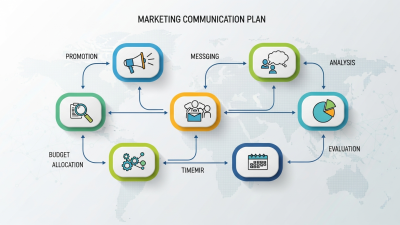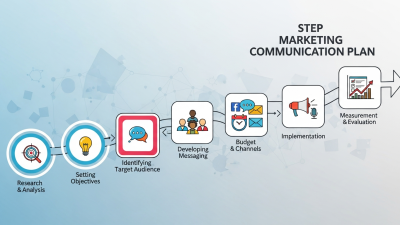Marketing communication roles bridge brands and audiences, emphasizing engagement and strategic messaging. Careers range from content and social media management to brand oversight and leadership. Success requires strong communication, digital proficiency, analytical thinking, and creativity. By building a portfolio, gaining experience, and staying current with trends, professionals can advance and make a meaningful impact in this evolving field.
Marketing communication roles have become some of the most sought-after positions in the business world. These professionals bridge the gap between brand messaging and audience engagement, crafting strategies that drive both awareness and revenue. If you’re considering a career in marketing communications or looking to advance in this field, understanding the landscape of available positions is essential.
What Are Marketing Communication Positions?

Marketing communication positions focus on crafting, managing, and executing strategies that effectively promote products, services, or brand narratives. Professionals in this field operate across a range of channels—from social media and email campaigns to public relations and content marketing—to connect with target audiences in impactful ways.
Unlike traditional marketing roles that often center purely on product promotion, marketing communication emphasizes relationship-building and meaningful engagement between brands and consumers. Success in this arena requires a unique blend of creativity, strategic planning, and data-driven insight.
With the rise of digital transformation, the scope of these roles has evolved dramatically. Today’s marketing communication professionals must navigate both legacy media and cutting-edge digital platforms, making the field both dynamic and demanding. For a deeper dive into developing a winning approach, explore our full marketing communications strategy guide.
Types of Marketing Communication Positions
Content Marketing Manager
Content marketing managers develop and oversee content strategies that attract and engage target audiences. They create editorial calendars, manage content production teams, and analyze performance metrics to optimize campaigns.
Key responsibilities include writing and editing blog posts, creating social media content, developing email marketing campaigns, and collaborating with design teams on visual content. These professionals often work closely with SEO specialists to ensure content ranks well in search engines.
Social Media Manager
Social media managers handle brand presence across various social platforms. They create posting schedules, engage with followers, monitor brand mentions, and run paid advertising campaigns on platforms like Facebook, Instagram, LinkedIn, and TikTok.
This role requires staying current with platform algorithm changes, social media trends, and emerging platforms. Social media managers must be both creative storytellers and data-driven analysts, able to craft engaging content while measuring its impact.
Communications Specialist
Communications specialists focus on internal and external communications for organizations. They write press releases, manage crisis communications, coordinate with media outlets, and develop messaging for corporate announcements.
These professionals often serve as the primary point of contact between their organization and journalists, industry analysts, or other external stakeholders. Strong writing skills and the ability to work under pressure are essential for success in this role.
Digital Marketing Coordinator
Digital marketing coordinators support various online marketing initiatives. They assist with email marketing campaigns, website content updates, online advertising management, and marketing automation processes.
This entry-level position provides exposure to multiple aspects of digital marketing, making it an excellent starting point for those new to the field. Coordinators often work with marketing managers to execute larger strategic initiatives.
Brand Manager
Brand managers oversee the overall perception and positioning of a brand in the marketplace. They develop brand guidelines, ensure consistent messaging across all communications, and work with various teams to maintain brand integrity.
These roles require a deep understanding of consumer psychology, market research, and competitive analysis. Brand managers must think strategically about long-term brand development while managing day-to-day communications needs.
Marketing Communications Director
Marketing communications directors lead entire communications departments. They develop overarching communication strategies, manage budgets, oversee multiple team members, and report results to executive leadership.
This senior-level position requires extensive experience in marketing communications, strong leadership skills, and the ability to align communication strategies with broader business objectives.
Essential Skills for Marketing Communication Roles
Written and Verbal Communication
Exceptional communication skills form the foundation of any marketing communication position. Professionals must write compelling copy, present ideas clearly to stakeholders, and adapt their communication style for different audiences and platforms.
This includes mastering various writing formats—from social media posts and email subject lines to long-form blog articles and press releases. The ability to distill complex information into clear, engaging messages is particularly valuable.
Digital Marketing Proficiency
Modern marketing communication professionals must understand digital marketing tools and platforms. This includes familiarity with content management systems, email marketing platforms, social media management tools, and analytics software.
Knowledge of SEO principles, Google Analytics, and paid advertising platforms gives candidates a competitive advantage. Many employers also value experience with marketing automation tools and customer relationship management (CRM) systems.
Analytical Thinking
Data-driven decision making has become crucial in marketing communications. Professionals must interpret performance metrics, identify trends, and use insights to optimize future campaigns.
This involves understanding key performance indicators (KPIs) such as engagement rates, conversion rates, and return on investment (ROI). The ability to create reports and present findings to stakeholders is equally important.
Creative Problem-Solving
Marketing communication challenges often require creative solutions. Whether developing a campaign concept, addressing a PR crisis, or finding new ways to engage audiences, professionals must think creatively while staying aligned with brand guidelines and business objectives.
Project Management
Marketing communication roles typically involve managing multiple projects simultaneously. Strong organizational skills, attention to detail, and the ability to meet deadlines are essential for success.
Many professionals find value in learning project management methodologies and tools, as these skills become increasingly important in senior-level positions.
How to Land a Marketing Communication Position

Build a Strong Portfolio
Create a portfolio showcasing your best work across different formats and platforms. Include writing samples, campaign results, social media content, and any other relevant projects that demonstrate your abilities.
For those new to the field, consider creating mock campaigns or volunteering for nonprofit organizations to build portfolio pieces. Quality matters more than quantity—focus on showcasing work that demonstrates strategic thinking and measurable results.
Gain Relevant Experience
Look for internships, entry-level positions, or freelance opportunities in marketing communications. Even positions in related fields like customer service, sales, or journalism can provide transferable skills.
Consider taking on additional responsibilities in your current role that involve communication or marketing activities. This demonstrates initiative and helps build relevant experience.
Develop Technical Skills
Invest time in learning relevant software and platforms. Many online courses and certifications are available for tools like Google Analytics, HubSpot, Hootsuite, and Adobe Creative Suite.
These technical skills can set you apart from other candidates and demonstrate your commitment to professional development.
Network Within the Industry
Attend marketing conferences, join professional associations, and connect with industry professionals on LinkedIn. Building relationships within the marketing communication community can lead to job opportunities and valuable mentorship.
Consider participating in local marketing meetups or online communities where you can learn from experienced professionals and stay current with industry trends.
Tailor Your Application Materials
Customize your resume and cover letter for each position, highlighting relevant experience and skills that match the job requirements. Use keywords from the job posting to help your application get noticed by applicant tracking systems.
Include quantifiable achievements whenever possible, such as “increased social media engagement by 150%” or “managed content calendar for 5 social media platforms.”
Career Growth and Advancement
Marketing communication positions offer numerous paths for career advancement. Entry-level professionals can progress to senior specialist roles, then move into management positions overseeing teams and budgets.
Many professionals eventually transition into broader marketing roles, such as marketing director or chief marketing officer positions. Others may specialize in specific areas like digital marketing, public relations, or brand management.
Continuous learning is essential for career growth in this rapidly evolving field. Stay current with industry trends, new technologies, and best practices through professional development opportunities, industry publications, and networking events.
Your Next Steps in Marketing Communications

Marketing communication positions offer exciting opportunities for creative professionals who want to make a meaningful impact on business success. The field continues to evolve with new technologies and changing consumer behaviors, creating diverse career paths for ambitious professionals.
Start by assessing your current skills and identifying areas for development. Build a portfolio that showcases your abilities, gain relevant experience through internships or volunteer work, and begin networking with industry professionals.
Whether you’re just beginning your career or looking to make a strategic move, the marketing communications field offers rewarding opportunities for those willing to invest in their professional development. Take the first step today by exploring available positions and beginning to build the skills that will set you apart in this competitive but rewarding field.
Conclusion
Marketing communication positions combine creativity, strategy, and data-driven insight to connect brands with audiences effectively. These roles range from entry-level coordinators to directors managing departments, each requiring unique skills and adaptability. Professionals who develop strong communication, analytical, and technical abilities, along with industry knowledge, can advance rapidly while driving measurable impact for organizations.
Frequently Asked Questions (FAQs)
What are marketing communication positions?
Marketing communication positions involve creating, managing, and executing strategies that convey a brand’s message to its target audience. Professionals in these roles work across multiple channels, including social media, email, PR, content marketing, and advertising. The goal is to build brand awareness, engage audiences meaningfully, and support business objectives. These positions range from entry-level coordinators to senior directors overseeing entire communications departments.
What skills are essential for marketing communication roles?
Key skills include strong written and verbal communication, digital marketing proficiency, creativity, analytical thinking, and project management. Professionals must write compelling content, interpret performance metrics, and use tools like social media platforms, email software, and analytics dashboards. Adaptability, problem-solving, and the ability to collaborate across teams are also crucial for success in a fast-evolving marketing landscape.
How do content marketing managers differ from social media managers?
Content marketing managers focus on creating and overseeing content strategies, including blogs, emails, videos, and other materials that attract and retain audiences. Social media managers concentrate on managing platforms like Instagram, LinkedIn, and TikTok, posting content, engaging followers, and analyzing social metrics. While both roles require creativity and analytics, content managers take a broader strategic approach, whereas social media managers focus on platform-specific execution.
Is experience in digital marketing necessary for these positions?
Yes, digital marketing experience is increasingly essential. Professionals must understand SEO, social media marketing, email campaigns, content management systems, and analytics tools. Digital proficiency allows candidates to plan, execute, and optimize campaigns effectively. While traditional communication skills remain valuable, combining them with digital expertise greatly enhances career prospects in modern marketing communication roles.
Can marketing communication roles lead to executive positions?
Absolutely. Professionals can progress from entry-level roles to managerial positions, eventually moving into senior leadership roles such as Marketing Communications Director, VP of Marketing, or Chief Marketing Officer. Advancement requires a combination of experience, strategic thinking, leadership skills, and proven results in campaign performance and audience engagement.
How important is a portfolio for career advancement?
A portfolio is highly important, especially for creative and content-focused roles. It showcases your work, including writing samples, campaign results, social media content, design collaborations, and any measurable impact. A strong portfolio demonstrates expertise, strategic thinking, and tangible results, making it easier to stand out to hiring managers and qualify for advanced positions.
What are the entry-level positions in marketing communications?
Entry-level positions include Digital Marketing Coordinator, Marketing Assistant, Social Media Associate, and Junior Content Creator. These roles provide exposure to campaign execution, content creation, social media management, and analytics. They are ideal for building foundational skills, understanding industry practices, and gaining experience necessary for progression into mid-level and senior positions.
How do brand managers maintain consistency across channels?
Brand managers maintain consistency by developing and enforcing brand guidelines, including tone, messaging, visual identity, and positioning. They collaborate with teams across marketing, design, and communications to ensure all content aligns with the brand’s identity. Regular audits, training sessions, and approval processes help prevent inconsistencies and reinforce a cohesive brand presence across all platforms.
Are marketing communication roles suitable for creative professionals?
Yes, marketing communication roles are ideal for creative professionals who enjoy storytelling, content creation, and visual design. Creativity is essential for developing engaging campaigns, unique messaging, and compelling social media strategies. These roles also require balancing creativity with data analysis and strategy to ensure campaigns deliver measurable results.
How do marketing communications professionals measure success?
Success is measured using key performance indicators (KPIs) such as engagement rates, website traffic, social shares, conversions, lead generation, brand awareness metrics, and ROI. Professionals analyze metrics to determine which campaigns resonate with audiences, optimize strategies, and report results to stakeholders. Effective measurement combines quantitative data with qualitative insights to guide decision-making.
Can technical skills outweigh experience in marketing communication?
Technical skills, such as proficiency with analytics, marketing automation, CRM software, SEO, and social media management tools, are highly valuable. While experience provides strategic insight, strong technical expertise can compensate, particularly for entry-level roles or positions requiring specific digital capabilities. Ideally, candidates balance both technical skills and hands-on experience to maximize effectiveness.
What emerging trends should professionals focus on?
Marketing communication professionals should focus on trends like AI-driven personalization, data analytics for audience insights, interactive and video content, omnichannel marketing, and sustainable or socially responsible messaging. Staying current with platform updates, algorithm changes, and emerging digital tools ensures campaigns remain relevant and competitive in a rapidly evolving marketing environment.





